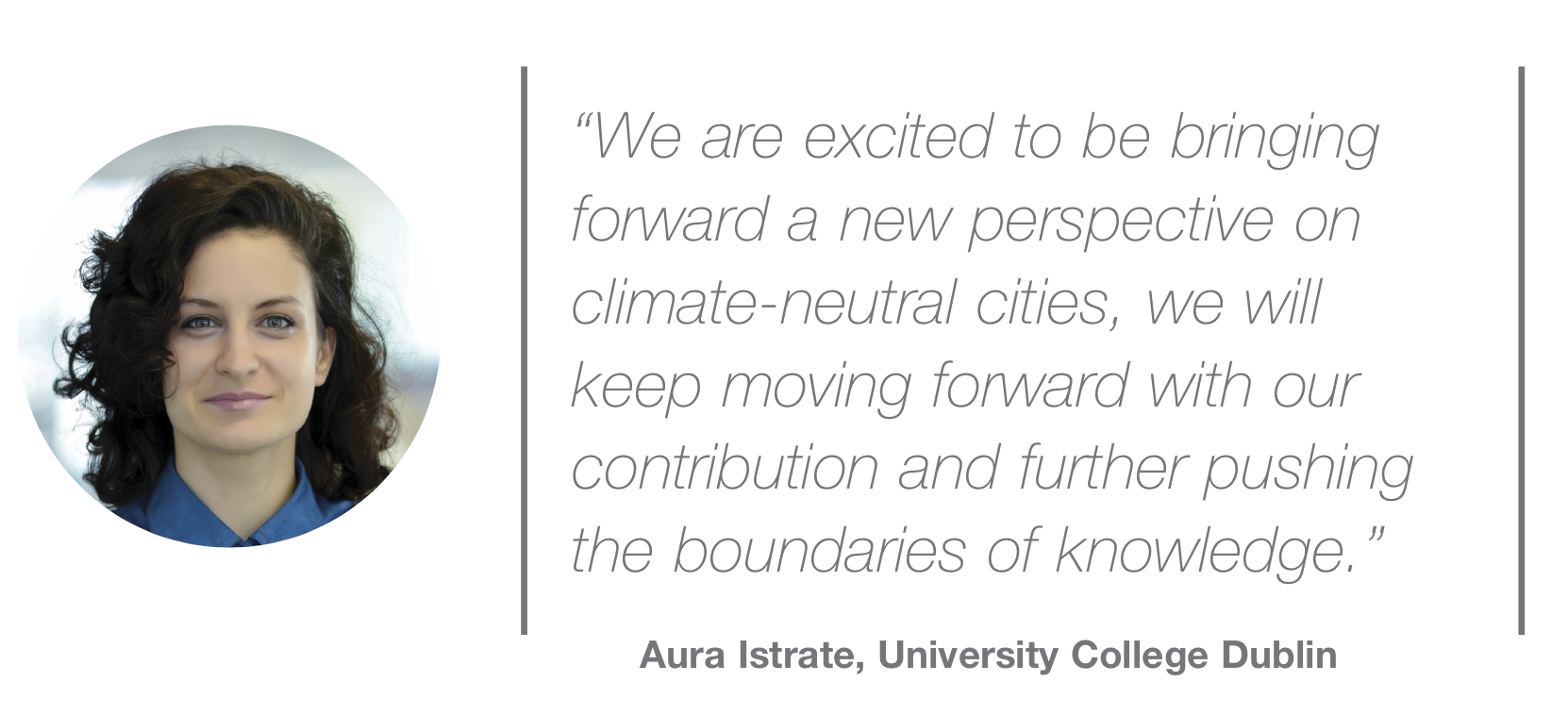Integrated planning of climate neutral cities

Aura Istrate, Assistant Professor in Urban Planning and Sustainable Urbanism at University College Dublin tells eolas Magazine how the C-NEWTRAL doctoral network is looking at new approaches to integrated planning of climate neutral cities through citizen engagement and city governance decision making.
C-NEWTRAL doctoral network stands for “smart comprehensive training to mainstream new approaches for climate-neutral cities through citizen engagement and decision-making support for innovative governance and integrated planning”.
The network is rising to the challenge of creating climate neutral cities, Istrate says: “To become climate neutral by 2030, cities require enhanced capacity and ongoing support to implement climate neutral solutions and assess how this may impact different sections of society.
“Our approach encompasses integrating pillars of urban nature, urban mobility, build-form, energy, and circularity.”
“The aim of the project is to provide highly skilled, highly trained interdisciplinary researchers and professionals for this task of achieving climate neutral cities.”
The European Commission have designated 100+12 climate neutral and smart cities by 2030, under the so-called Cities Mission. Istrate explains that “C-NEWTRAL aims to align with the EU’s City Mission enablers, particularly with participative city governance and integrated urban planning”.
A pan-European project
Six universities, the University of Bologna, University of Girona, Heidelberg University, University of Helsinki and Queen’s University Belfast, with University College Dublin (UCD) as the coordinating institution, act as host institutions.
Between them, there are 12 individual doctoral projects under the umbrella of climate neutral cities.
Throughout each project, researchers undergo a secondment while completing a PhD, Istrate says: “We invited several associated partners to provide network wide training on either citizen engagement tools or decision-making support for city governance.
“We have a high number of partners from industry, NGOs or local authorities across Europe to provide a secondment to our researchers. For three months, our researchers should work with associated partners on a common project sitting under the climate neutral city vision.”
The basis of the methodology is formed by participative methods alongside governance and planning tools while digital technologies and AI are briefly touched on.
Twelve researchers are positioned on different themes, all of which lead to different perspectives to inform a climate neutral city.
Istrate gives an overview of preliminary results expected from the project: “Falling under the citizen engagement pillar, one of the projects led by the University of Helsinki will first produce a comprehensive literature review of citizen science tools to integrate nature-based solutions for urban regeneration, that will further inform the research design and methodology of the respective PhD project. Furthermore, our colleagues from the University of Bologna will deliver a matrix of building energy solutions organised based on performance levels. Likewise, one project at Queen’s University Belfast will research effective pathways for user-centred implementation of energy efficient policy in neighbourhoods. Another PhD project at Heidelberg University will look into mobility justice.
“We also must deliver results under the city governance decision making pillar, and these include a digital water policy, to reveal and create a methodology for the negative externalities that are brought in when using AI for green and digital water transformation, to be delivered by the University of Girona.
“In UCD, we must provide comparative theoretical as well as empirical understanding of coupling active mobility with blue-green infrastructure. There will also be a framework for effective decision support systems for renewable energy communities, alongside a framework for digital tools optimisation for urban water management to be delivered by partner universities in C-NEWTRAL”.

Increasing participatory planning
Within the 12 individual projects, Istrate exemplified project DC6, concerning data-driven participatory planning to integrate nature-based solutions in cities. The assistant professor contextualises: “The gap is that research on data-driven methodologies for stakeholder involvement in integrating nature-based solutions in urban planning remains limited.
“DC6 project therefore aims to address this current lack of data driven tools, in order to allow stakeholders and citizens to evaluate, visualise or understand the impacts of different urban initiatives on nature and biodiversity.”
The overarching research question is, how can digital tools facilitate integrating nature-based solutions through participatory urban planning?
With such a broad question, Istrate explains: “We broke this overarching research question into several subquestions such as: What are the difficulties in adopting nature-based solutions in urban planning? How do we integrate and assess the performance of nature-based solutions in cities? How do we increase public interest? What kind of digital platforms or tools would serve to involve a large number of stakeholders in this aim?”
Augmented reality is one of the solutions considered. This would involve, for example, a phone or tablet showing potential plans through its screen in real time, portraying an estimation of what the future might look like. “We are considering how to get citizens to use the tools developed, how to make it a more interesting experience for them because it is difficult otherwise to engage citizens in participatory planning processes, unless these tools are more interactive, or more playful.”
While this PhD project is primarily carried out under Istrate’s supervision at UCD in the context of Dublin, as the project evolves, it is hoped to incorporate more European cities into it, such as the city of Heidelberg.
Other topics are also being explored, as Istrate asks: “How do integrated active mobility and blue-green infrastructure reinforce each other? Is blue-green infrastructure encouraging more users to cycle to work or school? Is this only psychological or does it have an impact in terms of physical health as well? These are some of the questions we are going to address under DC7 at UCD.”
Concluding, Istrate says: “We are excited to be bringing forward a new perspective on climate-neutral cities, we will keep moving forward with our contribution and further pushing the boundaries of knowledge.
“We hope to present some of our specific results in the years ahead.”





